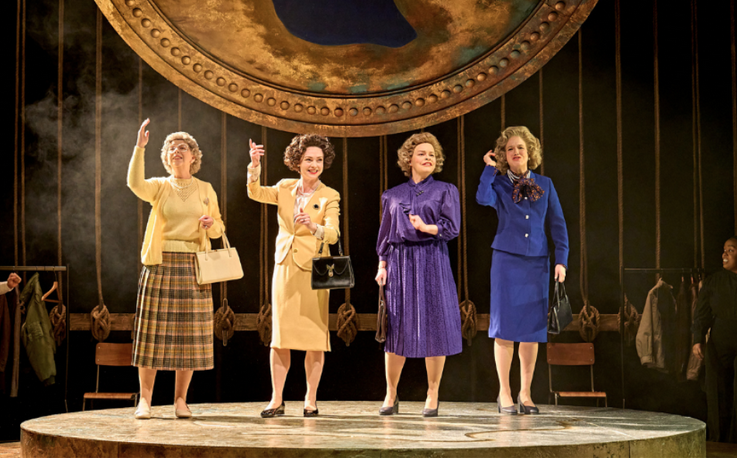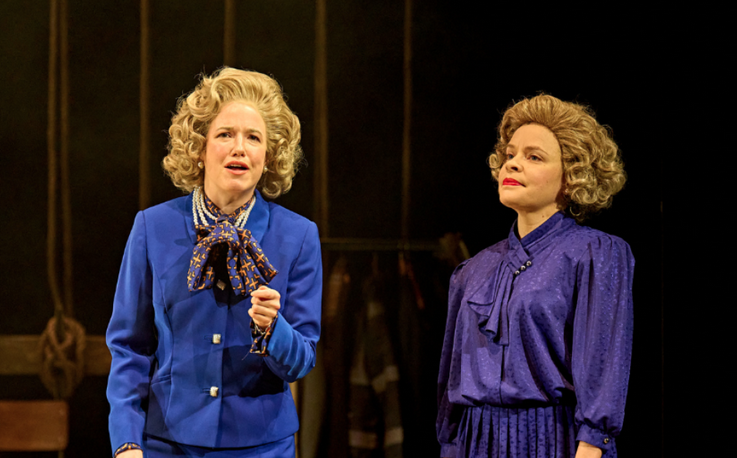
The relationship between Elizabeth II and the occupants of No 10 has been gold dust to dramatists and screen-writers as well as a gift to actors wanting to imitate those cut-glass royal tones or willing to sit under various prime ministerial wigs. The soap opera that was The Crown depended heavily on the weekly meeting between monarch and minister while Helen Mirren won an Oscar for her portrayal of HRH in The Audience, written by Peter Morgan.
But Moira Buffini got there first with Handbagged, which started life in 2010 as a one-acter before being developed into a full-length piece which is just finishing a regional revival at the Oxford Playhouse. Buffini concentrates on only one of the Queen’s many PMs: Mrs Thatcher. They’re both women with a shared longevity – Mrs T was the longest-serving PM of the 20th century – but other than that they don’t appear to have much in common. Indeed, from the Thatcher perspective, some of HM’s attitudes are ‘dubiously socialistic’. It is the Queen who extols the Commonwealth or a more equal society even as her Prime Minister is lamenting the decline of the British Empire or the snail-like economy. Some of this seems a bit implausible but since the weekly audiences are completely private almost anything can be read into them.
Anyway Handbagged is not a serious slice of history or at least not completely so. Two actors play each woman and occupy the stage simultaneously, which means that the older T (Morag Cross) can comment on or sometimes contradict the words of the younger Mags (Emma Ernest). The more senior version of the monarch – a relaxed, mischievous turn by Sarah Moyle – is offset by the relatively youthful Liz (Helen Reuben).
Around this foursome circle a gaggle of more than a dozen men, ranging from Denis Thatcher to Rupert Murdoch, from Kenneth Kaunda to Kenneth Clarke. Of necessity such figures remain more or less at the level of familiar caricature. All these parts are played by Dennis Herdman and Cassius Konneh, here making a strong stage debut. Occasionally they will speak out of character and complain about the state of the nation or even about their lines. After all, they’re just jobbing actors, as Mrs T likes to remind them if they step out of line. There is a knowing meta quality to Handbagged. According to the Queen: ‘Whatever we say must stay between these three walls.’ Mrs T wants to press on while her antagonist wants an interval – ‘Sometimes it’s the best part of the play.’ The Queen gets her way.
We race through the Thatcherite epoch under the assured direction of Alex Thorpe, from that speech on the doorstep of No 10 – remember ‘Where there is discord, may we bring harmony’? – to her exit thirteen years later through the same front door. The play is likely to have more appeal to those who have some recall of those years but, even so, there is some deftly handled exposition about, say, the struggle over independence for Rhodesia/Zimbabwe.
Handbagged isn’t a study in statecraft nor does it penetrate particularly deeply into character. Indeed the Queen’s myth rests on her impermeability while the Iron Lady could not afford to show that she was vulnerable – and, come to think of it, this is perhaps the most interesting link between these powerful women. Taken altogether, this revival of Moira Buffini’s play is a witty and sprightly dance through a period of near history.


